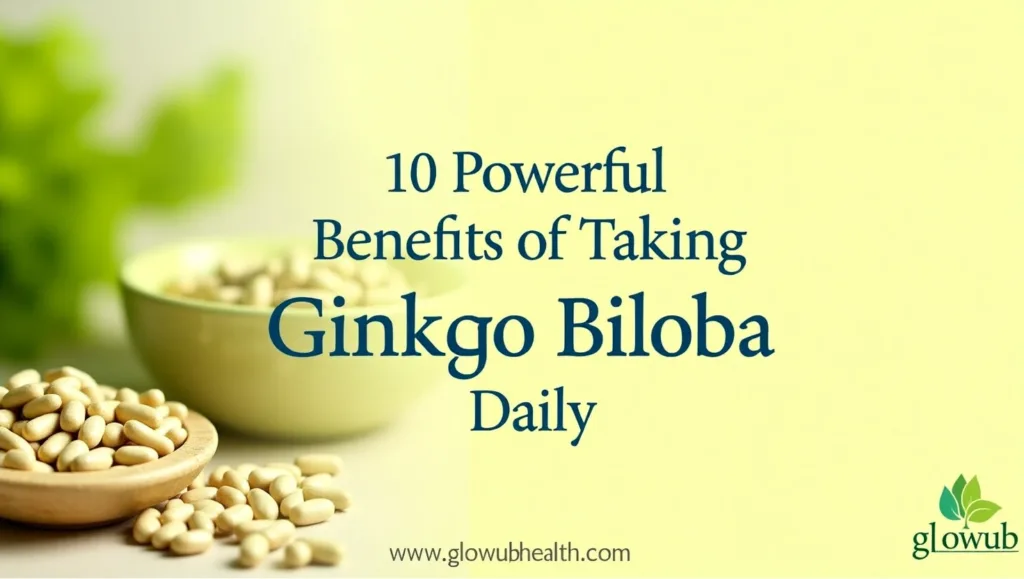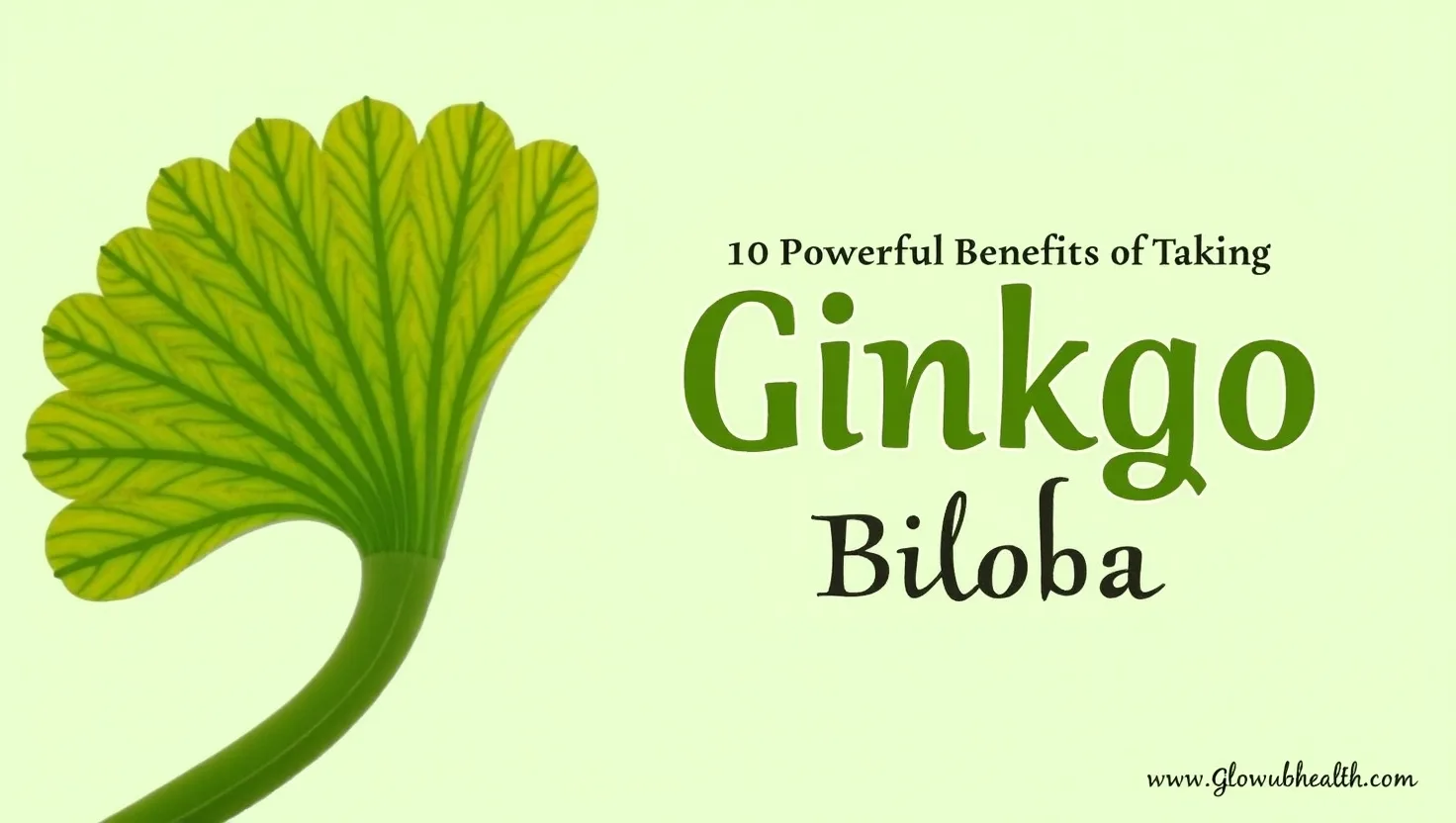10 Powerful Benefits of Taking Ginkgo Biloba Daily
Imagine starting your day with a simple supplement that could potentially sharpen your memory, boost your circulation, and protect your cells from damage. For thousands of people worldwide, ginkgo biloba isn’t just another supplement—it’s a daily ritual rooted in both ancient wisdom and modern science.
A botanical marvel, Ginkgo biloba has graced Earth for millennia—with some specimens reaching the millennium mark, earning its ‘living fossil’ title. Its distinctive fan-shaped leaves have been treasured in traditional Chinese medicine for millennia, but it’s only in recent decades that Western science has begun to validate many of its purported benefits.
Whether you’re concerned about cognitive decline, struggling with poor circulation, or simply looking to enhance your overall wellness routine, ginkgo biloba offers a fascinating array of potential benefits backed by an increasing body of scientific research.
In this comprehensive guide, we’ll explore ten evidence-backed benefits of taking ginkgo biloba . examining everything from its brain-boosting properties to its antioxidant effects. We’ll delve into the science behind these benefits, discuss practical applications, and provide guidance on how to safely add this remarkable herb to your wellness routine.
Understanding Ginkgo Biloba: Nature’s Brain Tonic
Before diving into the specific benefits, it’s important to understand what makes ginkgo biloba such a powerful natural remedy.
What Is Ginkgo Biloba?
Ginkgo biloba is derived from the maidenhair tree, which has survived virtually unchanged for more than 200 million years. The tree’s extraordinary resilience—some specimens even survived the atomic bombing of Hiroshima—mirrors the resilience it may help foster in the human body.
The medicinal properties of ginkgo come primarily from two components:
- Flavonoids: These plant-based antioxidants help neutralize damaging free radicals.
- Terpenoids: These compounds improve circulation by dilating blood vessels and reducing the “stickiness” of platelets.
Modern ginkgo biloba supplements typically use standardized extracts from the leaves, concentrated to contain specific percentages of active compounds. The typical Ginkgo biloba extract is carefully calibrated to deliver 24% flavone glycosides and 6% terpene lactones – the key bioactive compounds behind its benefits.
How Ginkgo Works in the Body
Ginkgo’s mechanisms of action are diverse, which explains its wide range of benefits. Primarily, ginkgo:
- Enhances circulation system wide—from fingertips to frontal lobe—optimizing blood flow to both body and brain.
- Acts as an antioxidant, neutralizing harmful free radicals
- Reduces inflammation through various pathways
- Influences neurotransmitter systems involved in cognition and mood
This multifaceted approach means ginkgo doesn’t just target a single symptom or system—it works holistically to support overall health and address multiple concerns simultaneously.
Now, let’s explore the ten most compelling benefits of taking ginkgo biloba daily.
10 benefits of taking ginkgo biloba

1) Enhanced Cognitive Function and Memory
Perhaps the most well-known benefit of ginkgo biloba is its potential to support brain health and cognitive function.
The Science Behind Ginkgo and Brain Health
Research suggests that ginkgo biloba’s cognitive benefits stem from several mechanisms:
- Improved cerebral blood flow: By enhancing circulation to the brain, ginkgo ensures neurons receive adequate oxygen and nutrients.
- Antioxidant protection: Neurons are particularly vulnerable to oxidative stress, which ginkgo’s flavonoids help combat.
- Neurotransmitter modulation: Studies indicate ginkgo may influence neurotransmitters like dopamine and serotonin, which affect memory and mood.
A meta-analysis published in the Journal of Pharmaceutical Health Care and Sciences reviewed multiple studies and found that ginkgo extract produced significant positive effects on cognitive function in both healthy individuals and those with mild cognitive impairment.
Who Can Benefit Most?
While many associate ginkgo with preventing age-related cognitive decline, its benefits extend to various groups:
- Aging adults concerned about maintaining cognitive function
- Students seeking improved focus and memory during intensive study periods
- Professionals in high-demand cognitive environments
- Anyone experiencing “brain fog” or difficulty concentrating
Dr. Sarah Collins, a neurologist specializing in cognitive health, notes: “What makes ginkgo particularly interesting is its potential dual action—not just potentially slowing cognitive decline but possibly enhancing function even in healthy individuals.”
Personal Experience: Michael’s Story
Michael, a 58-year-old professor, began taking ginkgo biloba after noticing he was having more difficulty remembering his students’ names and research details. “After about six weeks of daily supplementation, I noticed a tangible difference,” he shares. “My recall became sharper, and I found myself less reliant on notes during lectures.
It wasn’t a dramatic overnight change, but rather a gradual return to the mental clarity I’d taken for granted in my younger years.”
2) Improved Circulation and Heart Health
Beyond its cognitive benefits, ginkgo biloba is valued for its positive effects on circulation and cardiovascular health.
Read More: Enhanced Circulation : 10 Natural Ways to Improve Blood Flow and Boost Your Health
How Ginkgo Supports Vascular Health
Ginkgo biloba contains compounds that influence blood vessels in several beneficial ways:
- Dilates blood vessels through production of nitric oxide
- Reduces blood viscosity, allowing for smoother flow
- Protects vessel walls from oxidative damage
- Inhibits platelet aggregation, reducing excessive clotting
Research published in the International Journal of Cardiology demonstrated that ginkgo extract improved endothelial function—the health of the cells lining blood vessels—in patients with coronary artery disease.
Supporting Peripheral Circulation
One area where ginkgo shows particular promise is in addressing peripheral circulation issues. A systematic review in the Journal of Cardiovascular Pharmacology and Therapeutics found that ginkgo supplementation improved pain-free walking distance in people with peripheral artery disease.
For those with chronically cold hands and feet due to poor circulation, regular ginkgo supplementation may offer welcome relief.
This benefit extends to various conditions associated with compromised peripheral circulation:
- Raynaud’s phenomenon, characterized by temporary blood vessel constriction in extremities
- Diabetic microvascular complications affecting small blood vessels
- Venous insufficiency, when veins struggle to return blood to the heart
Dr. James Harrison, a cardiologist at Midwestern Medical Center, explains: “The vascular benefits of ginkgo are particularly interesting because they appear to target multiple aspects of circulation not just blood flow itself, but also vessel health and blood composition.”
3) Powerful Antioxidant Protection
Oxidative stress—an imbalance between free radicals and antioxidants—is implicated in numerous chronic diseases and aging processes. Ginkgo biloba offers robust antioxidant properties that may help protect cells throughout the body.
Ginkgo’s Unique Antioxidant Profile
Ginkgo contains several types of antioxidants that work through different mechanisms:
- Flavonoids like quercetin and kaempferol that neutralize free radicals
- Terpenoids that interrupt oxidative chain reactions
- Proanthocyanidins that protect cell membranes
Research published in Phytotherapy Research demonstrated that ginkgo extract could protect cells from oxidative damage induced by hydrogen peroxide, a potent oxidizing agent.
Cellular Protection Throughout the Body
The antioxidant benefits of ginkgo aren’t limited to the brain—they extend throughout the body, potentially protecting:
- Skin cells from UV and environmental damage
- Eye tissues vulnerable to oxidative stress
- Cardiovascular tissues subject to lipid peroxidation
- DNA from mutations that could lead to abnormal cell growth
A study in the Journal of Pharmacy and Pharmacology found that ginkgo extract protected liver cells from oxidative damage, suggesting a hepatoprotective (liver-protecting) effect.
Combining Ginkgo with Other Antioxidants
Many nutritionists recommend combining ginkgo with other antioxidant-rich supplements or foods for synergistic effects. Integrative medicine practitioner Dr. Emily Chen suggests: “I often recommend ginkgo alongside vitamin C, vitamin E, and a diet rich in colorful fruits and vegetables.
These combinations create a comprehensive antioxidant network that addresses free radicals through multiple pathways.”
4) Relief from Anxiety and Depression
While ginkgo biloba is not a primary treatment for mood disorders, research suggests it may have beneficial effects on both anxiety and depression.
The Neurotransmitter Connection
Ginkgo’s impact on mood appears to involve several mechanisms:
- Modulation of serotonin and dopamine, neurotransmitters involved in mood regulation
- Reduction of stress hormone levels through adaptogenic properties
- Anti-inflammatory effects on brain tissue
- Improved cerebral blood flow supporting overall brain function
A study published in the Journal of Psychiatric Research found that ginkgo extract was more effective than placebo in reducing anxiety symptoms in patients with generalized anxiety disorder.
Stress Adaptation and Resilience
Some researchers classify ginkgo as an adaptogen—a substance that helps the body resist various stressors. Regular supplementation may support a more balanced stress response, potentially preventing the mood dips that often accompany chronic stress.
Research in the Journal of Neural Transmission found that ginkgo extract helped normalize stress hormone levels in chronically stressed individuals, suggesting it might help the body adapt to ongoing stressors more effectively.
Complementary Approach to Mood Support
Mental health professionals emphasize that while ginkgo may offer support for mood issues, it should be viewed as complementary rather than as a replacement for established treatments.
Clinical psychologist Dr. Robert Freeman notes: “For patients with mild to moderate mood concerns who prefer a natural approach, ginkgo may be worth considering as part of a comprehensive plan that includes lifestyle modifications, proper sleep, and appropriate professional support when needed.”
5) Vision Protection and Eye Health
The eyes are particularly vulnerable to oxidative damage due to their high oxygen consumption and exposure to light. Ginkgo biloba shows promise for supporting various aspects of eye health.
Supporting Retinal Function
Research suggests ginkgo may benefit retinal health through several mechanisms:
- Improved microcirculation to the optic nerve and retina
- Protection against oxidative stress in retinal tissues
- Anti-inflammatory effects that may benefit the macula
- Regulation of glutamate levels, which can damage retinal cells when elevated
A study published in the International Journal of Ophthalmology found that ginkgo extract improved visual function in patients with normal tension glaucoma, possibly by improving ocular blood flow.
Benefits for Common Eye Conditions
Emerging research suggests ginkgo may offer support for several prevalent eye conditions:
- Age-related macular degeneration: By improving blood flow to the macula and providing antioxidant protection
- Diabetic retinopathy: By supporting microvascular health compromised by diabetes
- Glaucoma: By potentially reducing intraocular pressure and protecting optic nerve cells
- Eye fatigue: By improving oxygen delivery to eye tissues stressed by screen use
Optometrist Dr. Victoria Chang comments: “What makes ginkgo particularly interesting for eye health is that it addresses multiple mechanisms simultaneously—circulation, oxidative stress, and neural protection—all of which are important for maintaining vision as we age.”
Combining Ginkgo with Other Vision Supplements
For comprehensive eye support, many eye care professionals recommend combining ginkgo with other nutrients known to benefit vision:
- Zinc for retinal function
- Lutein and zeaxanthin for macular protection
- Omega-3 fatty acids for dry eye and general eye health
- Vitamin C and E for antioxidant support
6) Support for Tinnitus and Vertigo
Tinnitus (ringing in the ears) and vertigo (dizziness) can significantly impact quality of life. Ginkgo biloba has been studied for its potential to alleviate these inner ear-related conditions.
The Inner Ear Connection
Ginkgo may benefit inner ear function through:
- Enhanced microcirculation to the cochlea and vestibular apparatus
- Protection of hair cells from free radical damage
- Normalization of neurotransmitter systems involved in auditory processing
- Anti-inflammatory effects on inner ear structures
A systematic review published in Neuropsychiatric Disease and Treatment analyzed multiple clinical trials and found that ginkgo extract improved measures of tinnitus in some patients, particularly those with concurrent cerebrovascular insufficiency.
Clinical Evidence for Vertigo Relief
Ginkgo has shown particularly promising results for vertigo. A landmark study in the International Journal of Otolaryngology compared ginkgo extract to the prescription medication betahistine for vertigo and found comparable effectiveness, with ginkgo having fewer side effects.
ENT specialist Dr. Marcus Ibrahim explains: “What’s notable about ginkgo for vertigo is that it appears to address both the vascular and neural components. Many prescription treatments focus on just one pathway, but ginkgo’s multi-mechanism approach may explain why some patients respond particularly well to it.”
Personal Experience: Elizabeth’s Story
Elizabeth, a 62-year-old retired teacher, had struggled with tinnitus for nearly a decade: “The constant ringing was affecting my sleep and concentration. After three months on ginkgo biloba, I noticed the intensity had decreased significantly—not gone completely, but reduced to a level where I could often forget about it for hours at a time. For anyone living with tinnitus, that kind of relief is genuinely life-changing.”
7) Anti-inflammatory Effects
Chronic inflammation underlies many health conditions, from arthritis to heart disease. Ginkgo biloba contains multiple compounds with anti-inflammatory properties that may help address this root cause of illness.
How Ginkgo Combats Inflammation
Research indicates ginkgo reduces inflammation through several pathways:
- Inhibition of pro-inflammatory cytokines like TNF-α and IL-6
- Reduction of inflammatory enzyme activity including COX-2
- Modulation of the NF-κB pathway, a master regulator of inflammation
- Free radical scavenging, reducing oxidative stress that triggers inflammation
A study in the Journal of Pharmacy and Pharmacology demonstrated that ginkgo extract reduced inflammatory markers in models of inflammatory conditions, suggesting broad anti-inflammatory potential.
Applications for Inflammatory Conditions
The anti-inflammatory properties of ginkgo may provide support for various conditions with an inflammatory component:
- Osteoarthritis and rheumatoid arthritis
- Inflammatory skin conditions
- Asthma and allergic responses
- Neuroinflammation associated with cognitive decline
Rheumatologist Dr. Lisa Mehta notes: “While ginkgo wouldn’t be my first recommendation for severe inflammatory conditions, it may offer adjunctive benefits, especially for patients looking to reduce their reliance on NSAIDs or other anti-inflammatory medications that can have significant side effects with long-term use.”
Synergy with Other Anti-inflammatory Approaches
For those seeking a comprehensive approach to managing inflammation, ginkgo can complement other anti-inflammatory strategies:
- Stress management techniques
- Mediterranean or anti-inflammatory diet
- Omega-3 fatty acid supplementation
- Regular physical activity
8) Respiratory Health and Asthma Support
Less widely known but increasingly studied is ginkgo biloba’s potential to support respiratory health, particularly for those with asthma and related conditions.
Mechanisms for Respiratory Support
Ginkgo appears to benefit respiratory function through multiple pathways:
- Bronchodilation, helping to open airways
- Reduction of airway hyperresponsiveness to irritants
- Anti-inflammatory effects on bronchial tissues
- Antioxidant protection of lung cells from pollutants and toxins
A clinical trial published in the Journal of Asthma found that asthma patients taking ginkgo extract showed improved pulmonary function and decreased airway hyperreactivity compared to those taking placebo.
Benefits for Specific Respiratory Conditions
Research suggests ginkgo may offer support for several respiratory conditions:
- Asthma: By reducing bronchial inflammation and reactivity
- Chronic bronchitis: By improving mucus clearance and reducing inflammation
- Seasonal allergies: By modulating the histamine response
- COPD: By supporting oxygen delivery and reducing oxidative stress
Pulmonologist Dr. Thomas Wright explains: “What interests me about ginkgo for respiratory health is its multifaceted approach. Unlike bronchodilators that simply open airways or steroids that just reduce inflammation, ginkgo appears to work through multiple complementary mechanisms.”
Practical Application and Complementary Approaches
For those with respiratory concerns, integrative medicine practitioners often suggest a comprehensive approach that may include ginkgo alongside:
- Regular breathing exercises
- Environmental allergen reduction
- Appropriate medical management
- Other respiratory-supporting herbs like thyme and mullein
Many patients report that while ginkgo doesn’t replace their rescue medications, regular use seems to reduce their frequency of acute episodes and improve day-to-day breathing comfort.
9) Hormonal Balance and Sexual Health
For both men and women, ginkgo biloba may offer support for hormonal balance and sexual function through its effects on circulation, neurotransmitters, and stress response.
Supporting Women’s Hormonal Health
For women, ginkgo has been studied for its potential benefits in several areas:
- Premenstrual syndrome (PMS): May help reduce mood swings and physical discomfort
- Menopause symptoms: Some studies suggest improvement in cognitive complaints and mood fluctuations
- Sexual arousal disorders: By enhancing blood flow to genital tissues
- Antidepressant-induced sexual dysfunction: May counteract this common medication side effect
A study in the Journal of Women’s Health & Gender-Based Medicine found that women taking ginkgo extract showed significant improvement in sexual desire and satisfaction compared to those taking placebo.
Men’s Sexual Health and Function
For men, ginkgo may support sexual health through:
- Enhanced blood flow to genital tissues
- Nitric oxide modulation, supporting erectile function
- Stress reduction, addressing a common cause of sexual difficulties
- Neurotransmitter balance, potentially improving libido
Research published in the Journal of Sex & Marital Therapy indicated that ginkgo extract significantly improved erectile function in men with erectile dysfunction, with effects becoming more pronounced after 6-8 weeks of consistent use.
Balancing Approach to Sexual Wellness
Integrative sexual health specialist Dr. Rachel Thomas emphasizes: “Sexual health is multifaceted, involving physical, psychological, and relationship factors. Ginkgo can be a helpful component of a comprehensive approach that addresses all these aspects, particularly when circulatory or stress-related factors are contributing to difficulties.”
10) Enhanced Physical Performance and Energy
For those seeking to improve physical performance, whether for athletics or daily energy levels, ginkgo biloba offers several potential benefits.
Mechanisms for Performance Enhancement
Research suggests ginkgo may support physical performance through:
- Improved oxygen utilization in muscles and tissues
- Enhanced glucose metabolism for sustained energy
- Better mitochondrial function for cellular energy production
- Reduced oxidative damage from intense exercise
A study published in the International Journal of Sport Nutrition and Exercise Metabolism found that trained athletes taking ginkgo extract showed improved endurance and reduced perceived exertion during high-intensity exercise.
Applications for Different Types of Activity
Ginkgo’s benefits may extend to various forms of physical activity:
- Endurance exercise: By supporting oxygen delivery and utilization
- High-altitude activities: By helping adaptation to lower oxygen environments
- Strength training: By supporting recovery through improved circulation
- Daily energy levels: By enhancing cerebral blood flow and reducing mental fatigue
Sports nutritionist Dr. Andrew Parker notes: “Unlike stimulants that simply mask fatigue, ginkgo appears to address fundamental aspects of energy production and utilization. This makes it particularly interesting as a sustainable approach to supporting performance.”
Personal Experience: Sarah’s Story
Sarah, a 42-year-old recreational marathon runner, started taking ginkgo biloba after struggling with mid-run energy crashes: “I noticed a difference primarily in my longer training runs. The ‘wall’ I used to hit around mile 18 became less severe, and my recovery between training sessions seemed quicker. It wasn’t a dramatic performance enhancement, but rather a subtle improvement in how my body handled the demands I was placing on it.”
How to Use Ginkgo Biloba Effectively
To experience the benefits of ginkgo biloba, proper usage is essential. Here’s a comprehensive guide to incorporating this herb into your wellness routine.
Finding the Right Dosage
Clinical studies have used various dosages, but most research showing benefits has used:
- 120-240 mg daily of standardized extract (containing 24% flavone glycosides and 6% terpene lactones)
- Divided into 2-3 doses throughout the day for optimal absorption
- Taken with food to minimize any potential stomach discomfort
For specific conditions, dosage recommendations may vary:
- Cognitive support: 120-240 mg daily
- Circulation issues: 120-160 mg daily
- Tinnitus/vertigo: 160-240 mg daily
- Vision support: 120-240 mg daily
Dr. Michael Chen, a pharmacologist specializing in botanical medicine, advises: “Start with a lower dose and gradually increase to the target amount over a couple of weeks. This allows you to monitor how your body responds and reduces the likelihood of any adjustment symptoms.”
Choosing a Quality Supplement
Not all ginkgo supplements are created equal. Look for products that:
- Use standardized extract with specified percentages of active compounds
- Are tested by third-party organizations for purity and potency
- Come from reputable manufacturers with good quality control
- Contain minimal fillers and additives
Herbalist and natural product formulator Jennifer Lewis recommends: “When selecting a ginkgo supplement, look for products that specify both the total amount of extract and the standardization percentages. Avoid products that only list ‘ginkgo leaf’ without standardization information, as these may contain minimal active compounds.”
The Benefits of Ginkgo Tea
Some people prefer to consume ginkgo as a tea rather than a supplement. Benefits of ginkgo tea include:
- Gentler action that may suit sensitive individuals
- Ritual aspect that can enhance mindful consumption
- Additional hydration benefits
- Often better tolerated by those with sensitive digestion
However, it’s important to note that tea generally contains lower concentrations of active compounds than standardized extracts. For therapeutic purposes, supplements may provide more consistent results, while tea can be a pleasant maintenance approach.
Timing for Optimal Benefits
The timing of ginkgo supplementation can influence its effects:
- Morning and midday dosing is typically recommended for cognitive and energy benefits
- Evening doses might be avoided by those sensitive to stimulation
- Consistent daily use is important, as many benefits develop gradually over weeks
- Long-term commitment may be necessary, with some studies showing increasing benefits over 6-12 months
Dr. Jessica Williams, a naturopathic physician, explains: “Ginkgo isn’t typically a quick-fix solution. Think of it more as a tonic that gradually optimizes function over time. Most patients notice initial subtle benefits within 4-6 weeks, with more pronounced effects developing over 3-6 months of consistent use.”
Safety, Side Effects, and Precautions
While ginkgo biloba is generally considered safe for most adults, it’s important to be aware of potential concerns and contraindications.
Common Side Effects
Most people tolerate ginkgo well, but some may experience:
- Mild digestive upset: Nausea, diarrhea, or stomach pain
- Headache: Usually mild and temporary
- Dizziness: Particularly when starting supplementation
- Allergic reactions: More common in people with allergies to plants in the Ginkgoaceae family
These effects are typically mild and often resolve as the body adjusts to the supplement.
Important Drug Interactions
Ginkgo can interact with certain medications, including:
- Blood thinners (warfarin, aspirin): May enhance anticoagulant effects
- Antidepressants (particularly MAOIs and SSRIs): Potential serotonin-related interactions
- Diabetes medications: May affect blood sugar levels
- Seizure medications: Could affect seizure threshold
- NSAIDs: May increase bleeding risk
Dr. Nancy Rodriguez, a clinical pharmacist, advises: “Always disclose all supplements you’re taking to your healthcare providers, particularly if you’re on prescription medications. This is especially important before any surgical procedure, as ginkgo should typically be discontinued at least two weeks prior to surgery due to its mild blood-thinning effects.”
Who Should Avoid Ginkgo
Certain groups should exercise caution or avoid ginkgo entirely:
- Pregnant and breastfeeding women: Due to insufficient safety data
- Children: Most research has focused on adults
- People with bleeding disorders: Due to anticoagulant effects
- Those with epilepsy or seizure disorders: May lower seizure threshold in some cases
- Individuals scheduled for surgery: Should discontinue use beforehand
When to Consult a Healthcare Provider
It’s particularly important to consult with a healthcare provider before starting ginkgo if you:
- Take prescription medications
- Have existing health conditions, particularly cardiovascular or neurological
- Are planning a pregnancy
- Experience unexpected symptoms after starting supplementation
- Are considering giving ginkgo to an elderly person taking multiple medications
Integrative medicine physician Dr. Robert Thompson emphasizes: “Ginkgo is generally quite safe, but that doesn’t mean it’s appropriate for everyone. The ‘natural’ label doesn’t exempt it from having real physiological effects that can interact with medical conditions and medications.”
Conclusion: Is Ginkgo Biloba Right for You?
After exploring the remarkable range of potential benefits that ginkgo biloba offers, you may be wondering if this ancient herb deserves a place in your daily wellness routine.
Summarizing the Benefits
We’ve seen that regular ginkgo supplementation may support:
- Enhanced cognitive function and memory
- Improved circulation and heart health
- Powerful antioxidant protection
- Relief from anxiety and depression
- Vision protection and eye health
- Support for tinnitus and vertigo
- Anti-inflammatory effects
- Respiratory health and asthma support
- Hormonal balance and sexual health
- Enhanced physical performance and energy
The breadth of these potential benefits speaks to ginkgo’s unique mechanism of action improving circulation, providing antioxidant protection, and modulating inflammation throughout the body.
A Holistic Perspective
Integrative medicine practitioner Dr. Alexandra Wilson offers this perspective: “Ginkgo exemplifies what we look for in botanical medicine—a multi-system approach that addresses underlying mechanisms rather than just masking symptoms. However, it’s most effective when viewed as one component of a comprehensive approach to health that includes appropriate nutrition, movement, stress management, and when necessary, conventional medical care.”
For those intrigued by ginkgo’s potential benefits, starting with a high-quality supplement at a conservative dose, with the guidance of a knowledgeable healthcare provider, represents a prudent approach to exploring what this remarkable plant has to offer.
Whether you’re seeking to safeguard your cognitive function, improve circulation, or address specific health concerns, ginkgo biloba’s time-tested benefits and growing scientific support make it worthy of consideration as part of your daily wellness routine.
FAQ
What happens if you take Ginkgo Biloba every day?
Taking Ginkgo Biloba daily may enhance cognitive function, improve memory, and support better blood circulation, particularly to the brain. Regular intake can also help reduce symptoms of anxiety and may act as an antioxidant, protecting cells from oxidative stress. However, consistency and dosage matter—effects are typically noticed after several weeks of daily use.
What does Ginkgo Biloba do to your body?
Ginkgo Biloba works by increasing blood flow and improving oxygen delivery, particularly to the brain and extremities. It also acts as a natural antioxidant, reducing inflammation and protecting nerve cells. This may lead to better focus, reduced cognitive decline, and improved mental clarity. Some people also report enhanced mood and reduced symptoms of depression or anxiety.
What is Ginkgo Biloba best for?
Ginkgo Biloba is best known for supporting brain health—especially for memory enhancement, mental alertness, and age-related cognitive decline. It’s also used to alleviate symptoms of anxiety, improve circulation, and reduce the frequency of headaches or migraines. Additionally, it may support eye and ear health, including conditions like glaucoma or tinnitus.
What are the disadvantages of Ginkgo?
Despite its benefits, Ginkgo Biloba may cause side effects in some individuals. Common drawbacks include headaches, dizziness, upset stomach, or allergic skin reactions. It can also increase the risk of bleeding, especially when taken with blood thinners. For this reason, it’s crucial to consult a healthcare provider before starting Ginkgo—especially before surgery or if you’re on medications.
Does Ginkgo make you sleepy?
Ginkgo Biloba typically does not cause drowsiness. In fact, many users report feeling more alert and mentally energized. However, individual responses may vary—some people may experience mild fatigue or sedation, particularly when taken in high doses or combined with other supplements.
Who should avoid Ginkgo?
Ginkgo Biloba should be avoided by individuals who are pregnant, breastfeeding, have bleeding disorders, epilepsy, or are scheduled for surgery. It may interact negatively with blood thinners (like warfarin), NSAIDs, and antidepressants. Always speak with a healthcare professional before using Ginkgo, especially if you’re on medication or have underlying health conditions.
Is it better to take Ginkgo at night or morning?
Most experts recommend taking Ginkgo Biloba in the morning or early afternoon, as it may boost energy, focus, and mental clarity throughout the day. Taking it at night is not ideal for everyone, as its stimulating effects could interfere with sleep in some individuals.
How does Ginkgo make you feel?
Many users report feeling more mentally sharp, focused, and less anxious when taking Ginkgo Biloba. Some experience improved memory, better concentration, and enhanced mental stamina. However, the effects can be subtle and vary depending on age, dosage, and overall health.






